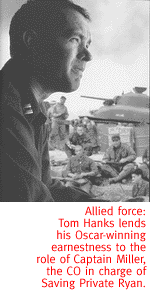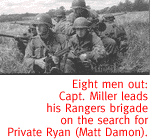
'Saving Private Ryan' Is Spielberg's Finest Couple Of Hours.
By Emil Franzi
TROOPS VOMITING IN a landing barge, blood-stained letters,
dog tags of the dead used as poker chips, rain drops falling on
leaves to the sound of distant gunfire, chewing gum passing mouth
to mouth, unraveling intestines, Edith Piaf, pulsing arteries--these
are the images of Steven Spielberg's WW II masterpiece, Saving
Private Ryan.
 It's not politically correct today to like war movies unless
they make Americans or American policy look bad. Spielberg, however,
understands that in an earlier time Americans had a different
attitude, value system, national purpose and some real leaders
we actually admired. And with this mastery, the man who brought
us Schindler's List has given us another magnificent piece
of cinema.
It's not politically correct today to like war movies unless
they make Americans or American policy look bad. Spielberg, however,
understands that in an earlier time Americans had a different
attitude, value system, national purpose and some real leaders
we actually admired. And with this mastery, the man who brought
us Schindler's List has given us another magnificent piece
of cinema.
Earlier WW II movies are not negated by Spielberg's realism.
Those classics like A Walk in the Sun, Battleground
and Sands of Iwo Jima are part of the same heritage. What
Spielberg gives us is more depth, the perspective of time, and
the advantages of both greater technology and realism not available
to earlier filmmakers.
 In the chaotic horrors depicted in the first 20 minutes, we see--and
of equal importance, hear--combat as it really is. Though
one should qualify: Today's hyper-realist approach to filmmaking
should not negate those earlier efforts equally reflective of
their time. If Psycho or Casablanca were made today,
would we expect to see Janet Leigh's character actually dismembered,
instead of blood merely running down the drain? Would Bogie and
Ingrid be doing more than just kissing? Would that make a better
movie? No.
In the chaotic horrors depicted in the first 20 minutes, we see--and
of equal importance, hear--combat as it really is. Though
one should qualify: Today's hyper-realist approach to filmmaking
should not negate those earlier efforts equally reflective of
their time. If Psycho or Casablanca were made today,
would we expect to see Janet Leigh's character actually dismembered,
instead of blood merely running down the drain? Would Bogie and
Ingrid be doing more than just kissing? Would that make a better
movie? No.
But Saving Private Ryan is technically stunning--about
that there is no dispute. Of equal importance to the visual is
the audio. Don't wait to play this on your VCR--you'll lose the
effect. And see it in a theater with DTS. The combination of close-ups,
eye-level cameras, and digital sound is a major achievement in
itself. And the historical accuracy is precise, from the vehicles
and weapons to the jargon. The John Williams score is subtle,
effective, and sparingly used.
But this is about much more than a close-up of the horrors of
war. The film contains many subtleties that will be discussed
for years. One friend described the story as "the Danny Boy
legend meets the Seven Samurai." It opens with a poignant
view of an old veteran approaching a Normandy cemetery with his
family. That scene carries the film's moral thrust, but is almost
forgotten until the moving ending through a series of images that
sear your brain.
The story unfolds around the discovery that three of four Ryan
brothers have been killed in combat. One Ryan is left--a paratrooper
somewhere behind German lines. The decision is made at the highest
level to send a small group of Rangers to find him and bring him
home. The leader of this small group is played brilliantly by
Tom Hanks. While some may find this needle-in-a-haystack hunt
a contrived device, it reflects Spielberg's knowledge of the values
of the times, namely that risking lives for a principle is the
right thing to do.
 As the hunt for Ryan proceeds, we watch the characters develop.
With the exception of Matt Damon as Private Ryan, most of the
characters are played by actors we don't know. I expect after
this, we will.
As the hunt for Ryan proceeds, we watch the characters develop.
With the exception of Matt Damon as Private Ryan, most of the
characters are played by actors we don't know. I expect after
this, we will.
One character is a coward, and Spielberg resists using the cliché
that turns him brave, allowing him to be despised. The others
you hope will survive.
While women have only minor parts in this film, they have major
roles in the overall plot. It's a woman who discovers that three
Ryans have been killed in action. Ryan's mother, who's shown briefly
and says nothing, is the key to the whole story. References to
mothers abound; and Hanks' character states his desire to "just
get back to his wife." The film's final scene involves an
old veteran seeking validation for his life from his wife. Anyone
not moved to tears by this scene has no soul.
This is a truly great film, perhaps Spielberg's finest effort.
It tells us exactly what it was our fathers and grandfathers and
brothers and uncles and cousins had to do to preserve our nation
and our freedoms. This ain't Platoon.
A film for all Americans, Saving Private Ryan is a tribute
to those who served and to why they served. If you ever
need a reason to be proud to be an American, buy a ticket to Saving
Private Ryan.

|





